This article was co-authored by Nicolas Adams and by wikiHow staff writer, Janice Tieperman. Nicolas Adams is a 5th generation musician of Serbian Gypsy descent and the lead guitarist of the band Gypsy Tribe. Based in the San Francisco Bay Area, Nicolas specializes in Rumba Flamenco and Gypsy jazz and playing the guitar, Bouzouki, Balalaika, and piano.
There are 14 references cited in this article, which can be found at the bottom of the page.
This article has been viewed 8,886 times.
Organizing a concert is a thrilling way to bring your community together for a night of unforgettable fun. But how do you transform your fantastic concert idea into a reality? This venture may seem a bit overwhelming at first, but it’s a lot easier to manage once you break your project into smaller, bite-sized tasks. We’re here to guide you along every step of the way so you can make your concert a night to remember!
Steps
How much does it cost to organize a concert?
-
1A venue can cost anywhere from a few thousand dollars to $50,000. Larger venues, like an arena, require a much bigger budget. Smaller, local venues are much more budget-friendly, and may only set you back a few thousand dollars. Keep in mind that larger venues have more seats, which can mean more potential sales.[1]
- It can be tough to book a large venue as a solo promoter, as big promotion companies tend to book these venues for large concert tours.
- Make sure that your venue matches your target audience. For example, if most of your concert-goers will be teens, you wouldn’t hold the concert at a 21+ nightclub.[2]
- When you’re first starting out, it might be easier to plan a regional concert instead of a huge event.[3]
-
2An artist can cost anywhere from $2,500 to over $400,000. As a concert organizer, you can either send the artist a flat payment or offer to give them a specific portion of the ticket sales. You can typically book smaller, wedding-style bands between $2,500 and $7,500, while popular artists can cost at least $400,000.[4]
- Negotiate with the artists to find a price that works well for both of you. For instance, if you’re hosting a charity concert, the artist might lower their booking price for the event.
- The booking cost can also depend on the band, time, and total playtime. For instance, a solo artist might charge $300 for 1-2 hours of music, and then charge $100 for each subsequent hour.[5]
- It's important to factor in location when booking an artist as well. The more the artist has to travel, the more you'll have to pay them.[6]
Advertisement -
3The concert crew gets paid hourly. Your “crew” includes the people loading equipment, as well as security officials, concession workers, bartenders, door attendants, and ticket staff. Pay your concert crew by the hour—you could pay anywhere from minimum wage to around $100 an hour, depending on how much experience your staff has.[7]
- For example, you might pay ticket staff $10 per hour, while the workers loading and unloading the stage might get $50 per hour.
- Estimate how much you’re able to pay your staff—depending on your budget, you might not be able to hire the most experienced workers for each position.
- Try to strike a balance between how many people you hire and how much you pay them. For instance, you don’t want to underpay anyone, but you also don’t want to hire someone unreliable in an attempt to save money.
- You might be able to hire volunteer staff if you’re hosting a charity concert.
How do you book an artist?
-
1Talk to the artist’s booking agent. Visit the artist’s official website and click on the “contact” or “contact us” tab. Most artists will provide their booking agent’s information on this page. Using this info, reach out to the booking agent and let them know about your upcoming concert.[8]
- Smaller, lesser-known bands may not have a booking agent. In this case, try to contact them directly.[9]
-
2Request a quote. Play your cards carefully as you start negotiating with the booking agent. If you’re upfront about your budget, the agent might blow you off for not offering enough, or try to ratchet up the artist’s price even more. Requesting a quote helps you know what you’re working with, and prevents you from losing money in the process.[10]
-
3Create a contract and ask the artist to sign it. A contract makes your concert more legally binding, so the artist can’t back out on a whim. Specify when the concert will be held, what you’re paying the artist, what happens if the artist quits the concert, and what happens if the event gets called off.[11]
- For example, the contract might state that you get all your money back if the artist cancels, while the artist will still get paid if the event is called off for bad weather.
-
4Send over an advance to the booking agent, manager, and artist. An “advance” goes over the nitty-gritty details about the concert, like loading and set times. Attach directions to the venue, along with any information about where they’re staying, when they’ll be eating, and what they need to do on the day of the concert.[12]
How do you book a concert venue?
-
1Pick a venue that meets your concert’s needs. Your venue will really depend on the scope of your concert. Are you booking a huge, headlining group, or are you hosting a smaller indie band? Choose a venue that meshes well with your band, and also fits into your budget. While you’re at it, think about the available parking, and what traffic will be like on the night of the concert.[13]
- Try to book small, local bands at least 3-4 months before the concert. If you’re working with a larger, mainstream band, book the artist at least 8-12 months in advance.[14]
- You could book an indie band to play at a local pub, or invite a wedding band to play at a restaurant.
- You might host the concert at a centrally-located hotel, business center, or conference center, or you could invite a lesser-known band to perform at a community center or sports club.
- You might book a headlining band to play at a well-known stadium or arena.
-
2Use a venue-searching website. Sites like Peerspace and EventUp make it easy to book a venue for your concert. On Peerspace, simply type in the event you’re planning, along with the date and location. On EventUp, just type in your event’s location to get a list of possible options. Then, browse through the different venue options in your area!
- Double-check the venue’s schedule before booking your event. You don’t want your concert interfering with other events at the venue!
When should you hold the concert?
-
1Choose a date that works for your artist. Talk to the band and discuss their upcoming performance schedule. Ask about which dates they have available, and when they’d prefer to perform at your concert.[15]
- Make sure the date and time work well for your target audience, too. For example, if most concert-goers will be in high school, you wouldn’t want to host the concert at 11 PM on a Thursday night.[16]
-
2Check that your concert date doesn’t interfere with other events. Do a quick online search and see what’s happening around the time of your proposed concert. If there are a lot of events happening that day, pick a different date for your concert.[17]
- Before changing the concert schedule, confirm that the new date works for the band.
How do you sell tickets to a concert?
-
1Set up an online page that’s easy to navigate. Create a “buy tickets” button that visitors can click on at any time, even if they’re scrolling through the site. Try to keep all of the concert and ticketing information on 1 page, so your customers don’t get confused as they shop. List the ticket prices clearly, as well as any extra fees the concert-goer has to pay. In general, just try to make the ticket-buying process as clear, simple, and seamless as possible.[18]
- If you can, let your customers buy tickets without requiring them to make an account on your website.
- Jot down your cost per ticket and total budget. This way, you can figure out how many tickets you’d have to sell in order to break even.[19]
- Price your tickets in different categories. For instance, there might be regular tickets for standard admission, special access passes, and VIP passes. Then, you could offer group discounts to encourage people to buy multiple tickets at once.
-
2Use a third-party ticket-selling website for a simple alternative. Sites like StubHub, Ticketmaster, SeatGeek, and Eventbrite offer an easy, straightforward ticket-selling experience. Make an account on the site of your choice, and fill out your concert information and ticket prices there.
- You can list your tickets on Ticketmaster, SeatGeek, and StubHub for free, but each company will collect a fee from the ticket price.
- Eventbrite charges extra fees depending on where you live and what Eventbrite package you ordered.[20] .
How do you promote a concert?
-
1Share your concert on social media. Set up a Facebook event page that people can RSVP to and buy tickets through. Update all of your social media profiles to promote the concert, like Twitter, Instagram, and LinkedIn. You can even make an event hashtag for your concert, which you can post all over social media.[22]
- Your event hashtag might be “SummerSlam” or “WinterJamSession.”
- Snapchat is a great way to appeal to younger concert-goers. You can even set up a geofilter for the day of your concert!
-
2Partner with brands, businesses, and special guests. If your concert is pretty big, contact different businesses and brands and see if they’d like to sponsor your event. You could also reach out to social media influencers and press partners and see if they’d be willing to promote your concert.[23]
- If you’re hosting a summer festival, you might contact a summer clothing brand for a potential sponsorship.
- If you’re hoping to attract a young audience to your concert, you might ask a social media influencer to mention your event to their followers.
- Check in with local businesses, too. They might be willing to help out at your event and promote themselves.
- Look for sponsors that align with the goals and demographics for your concert. For instance, a local restaurant might sponsor a benefit concert for world hunger.[24]
How do you set up a concert stage?
-
1Specify load times for the performers. Before the concert actually starts, the bands will need plenty of time to get their equipment ready. Set a specific time window on the concert date for your performers to load and move all their equipment onto the stage, so everything is ready to go before the concert starts.[25]
- Your venue might schedule the load-in times for the band.
- If you have 3 bands performing at your 8 PM concert, you might let the main band load their equipment between 1 and 3 PM, the support band load between 3:15 and 4:45 PM, and the opening band load between 5 and 6 PM.
-
2Perform a soundcheck. During a soundcheck, an audio engineer will test and tweak the venue’s PA system so the concert-goers can hear the music easily. If the band doesn’t have a lot of equipment to check, the soundcheck might only last 15-30 minutes. If your band has tons of instruments and equipment to check, the soundcheck might take up to 2 hours.[26]
-
3Test any lights and other visuals. Some bands might have special lights, pyrotechnics, or other visual effects to go along with their performance. If so, take some time to test all of these elements and make sure they’re working properly.[27]
- If the band doesn’t have a lot of extra visuals for their performance, you can skip this step.
References
- ↑ https://prism.fm/blog/insights/concert-cost-breakdown-where-promoters-are-spending/
- ↑ https://www.heatonthestreet.com/how-to-plan-a-concert-gig-checklist/
- ↑ https://www.heatonthestreet.com/how-to-plan-a-concert-gig-checklist/
- ↑ https://thewrightgroupnow.com/how-much-does-it-cost-to-organize-a-concert-in-denver/
- ↑ Nicolas Adams. Professional Guitarist. Expert Interview. 17 September 2019.
- ↑ Nicolas Adams. Professional Guitarist. Expert Interview. 17 September 2019.
- ↑ https://thewrightgroupnow.com/how-much-does-it-cost-to-organize-a-concert-in-denver/
- ↑ https://www.musicindustryhowto.com/how-to-book-a-singer-rapper-or-other-musician-for-an-event/
- ↑ https://prism.fm/blog/insights/how-to-book-bands-for-a-venue/
- ↑ https://www.musicindustryhowto.com/how-to-book-a-singer-rapper-or-other-musician-for-an-event/
- ↑ https://www.musicindustryhowto.com/how-to-book-a-singer-rapper-or-other-musician-for-an-event/
- ↑ https://www.musicindustryhowto.com/how-to-book-a-singer-rapper-or-other-musician-for-an-event/
- ↑ https://www.yapsody.com/ticketing/blog/10-steps-to-organize-a-successful-concert-event/
- ↑ https://prism.fm/blog/insights/how-to-book-bands-for-a-venue/
- ↑ https://www.yapsody.com/ticketing/blog/10-steps-to-organize-a-successful-concert-event/
- ↑ https://www.heatonthestreet.com/how-to-plan-a-concert-gig-checklist/
- ↑ https://www.yapsody.com/ticketing/blog/10-steps-to-organize-a-successful-concert-event/
- ↑ https://www.eventbrite.com.au/blog/sell-concert-tickets-ds0c/
- ↑ https://www.eventbrite.co.uk/blog/academy/winning-event-pricing-strategy/
- ↑ https://www.eventbrite.com/support/articles/en_US/Troubleshooting/how-much-does-it-cost-for-organizers-to-use-eventbrite?lg=en_US
- ↑ https://fouroverfour.jukely.com/culture/where-does-money-go-concert-ticket/
- ↑ https://www.eventbrite.com/blog/how-to-promote-event-social-media-ds00/
- ↑ https://www.heatonthestreet.com/how-to-plan-a-concert-gig-checklist/
- ↑ https://www.socialtables.com/blog/event-planning/ways-to-attract-sponsors/
- ↑ https://ennuimagazine.com/how-long-does-it-take-to-set-up-a-stage-for-a-concert/
- ↑ https://ennuimagazine.com/how-long-does-it-take-to-set-up-a-stage-for-a-concert/
- ↑ https://ennuimagazine.com/how-long-does-it-take-to-set-up-a-stage-for-a-concert/
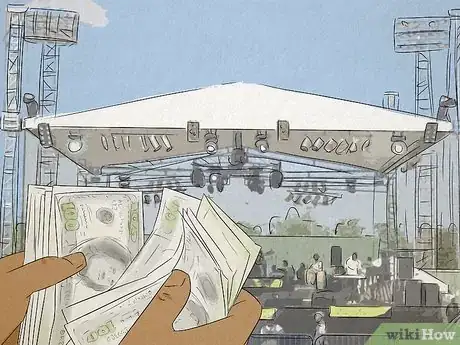


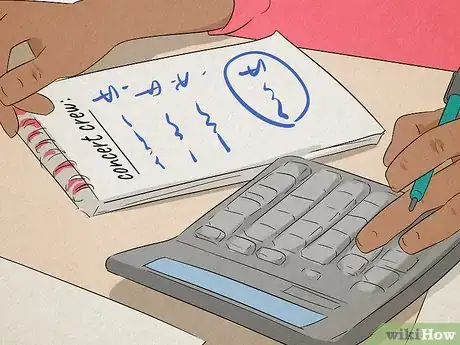
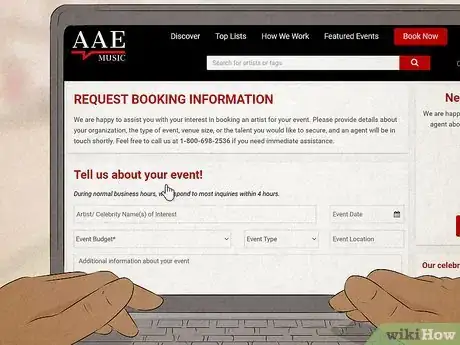

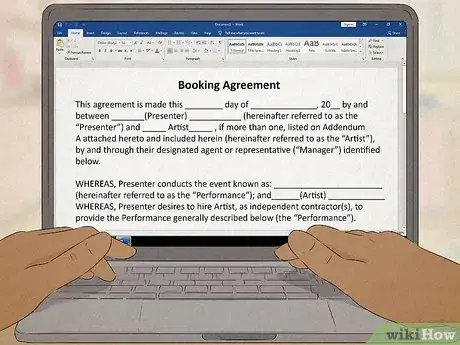


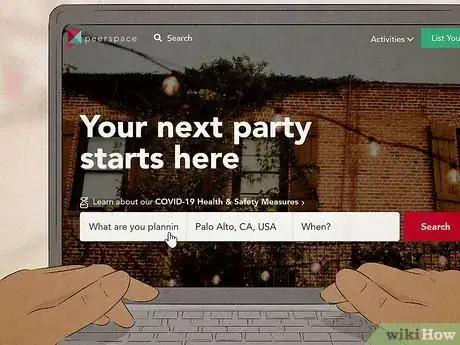

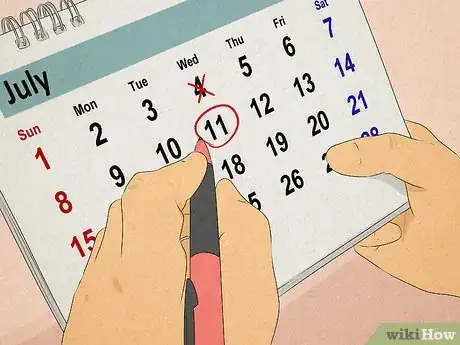
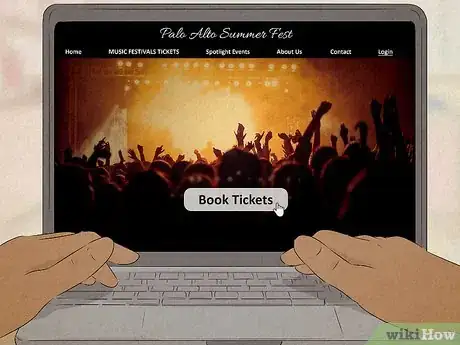
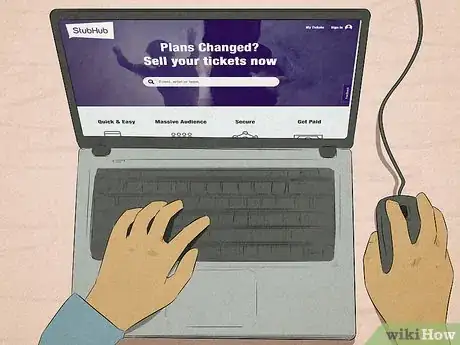
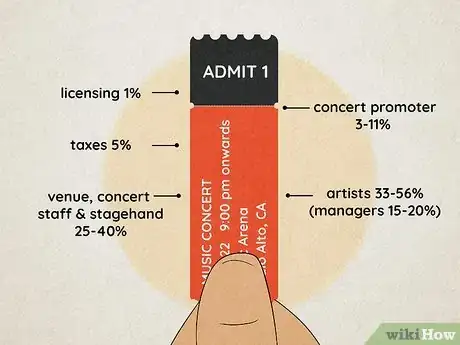
















-Step-12.webp)















































